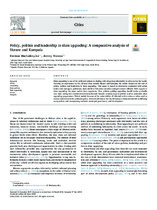| dc.contributor.author | Muchadenyika, Davison | |
| dc.contributor.author | Waiswa, Jeremy | |
| dc.date.accessioned | 2021-07-13T10:58:40Z | |
| dc.date.available | 2021-07-13T10:58:40Z | |
| dc.date.issued | 2018 | |
| dc.identifier.citation | Muchadenyika, D., & Waiswa, J. (2018). Policy, politics and leadership in slum upgrading: A comparative analysis of Harare and Kampala. Cities, 82(May), 58–67. https://doi.org/10.1016/j.cities.2018.05.005 | en_US |
| dc.identifier.issn | 0264-2751 | |
| dc.identifier.uri | https://doi.org/10.1016/j.cities.2018.05.005 | |
| dc.identifier.uri | http://hdl.handle.net/10566/6399 | |
| dc.description.abstract | Slum upgrading is one of the preferred options in dealing with ubiquitous informality in cities across the world.Drawing on experiences in two African cities namely Harare and Kampala; the article focuses on the role ofpolicy, politics and leadership in slum upgrading. This paper is based on interviews conducted with urbanleaders and managers, politicians, slum dwellers federation members and government officials. With regards toslum upgrading, the paper makes three arguments. First, policies guiding upgrading should evolve graduallyover time, taking into consideration lessons learned. Second, tensions in party-politics tend to undermine slumupgrading programmes. This is mainly because of the vulnerability of informal settlers who are often used assources and resources for political agency. Third, leadership at the city level plays a fundamental role in diffusingparty-politics and championing inclusive municipal governance, and development. | en_US |
| dc.language.iso | en | en_US |
| dc.publisher | Elsevier | en_US |
| dc.subject | Policy | en_US |
| dc.subject | Leadership | en_US |
| dc.subject | Party-politics | en_US |
| dc.subject | Slum upgrading | en_US |
| dc.subject | Harare | en_US |
| dc.title | Policy, politics and leadership in slum upgrading: A comparative analysis ofHarare and Kampala | en_US |
| dc.type | Article | en_US |

